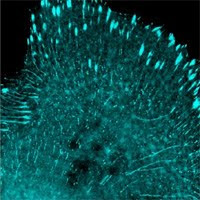On
June 10, 2013 Allele received an SBIR award from the National Institute
of Drug Abuse (NIDA/NIH) entitled “Revolutionary Technology for
Efficient Derivation of Human iPSCs with Messenger RNA”. The goal of
the proposed project is to provide to the biomedical research market an
advanced reagent kit and services for highly efficient reprogramming of
high quality human induced pluripotent stem cells (iPSCs). At the core
of this kit is the Allele team’s recent development transcribed
messenger RNA (mRNA). Compared to other reprogramming methods, such as
lentivirus, Sendai virus, protein, small molecules or any combinations
of these reagents, our new generation of the mRNA method often requires
less than half the time while sometimes achieving “bulk conversion”
efficiency.
While
the Allele reprogramming technology was designed for clinical use as
the process is feeder-free, xeno-free, chromosome integration-free, as
well as without the need for cell splitting, PI, Dr. Jiwu Wang states,
“Our purpose of executing the NIH-funded research it to make our method
so easy that any researcher can integrate iPSC into his or her
projects.” In addition to the extremely high efficiency, mRNA-generated
iPSCs should also be more stable because there are no genetic
alterations, more uniform among all clones as there is no clonal event,
and ultimately suitable for future autologous cell therapy now that
creating iPSCs from patient tissue cells should no longer be the
rate-limiting steps.
Allele’s business model is to provide cGMP-grade iPSCs
to pharmaceutical companies and perform large scale reprogramming by
partnering first with university-affiliated hospitals. Great progress
has been made in both directions, which has prompted the initiation of a
cGMP unit within Allele’s newly acquired building in San Diego.




No comments:
Post a Comment